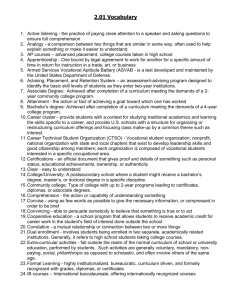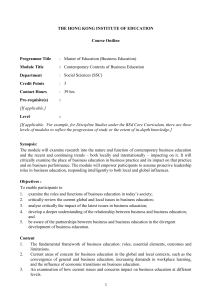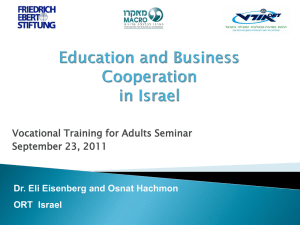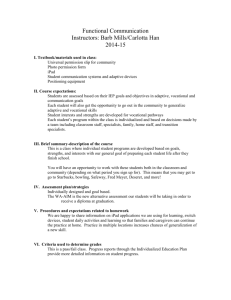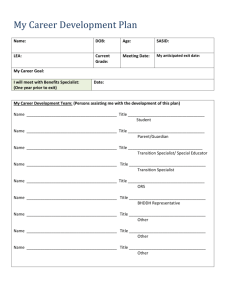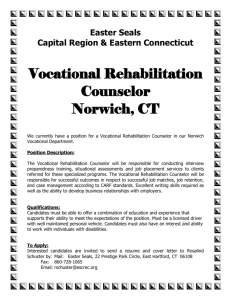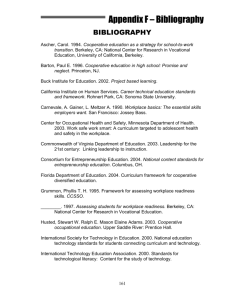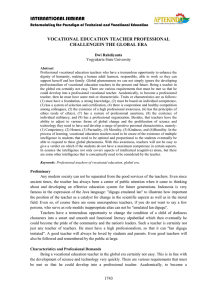LE3O Report 6
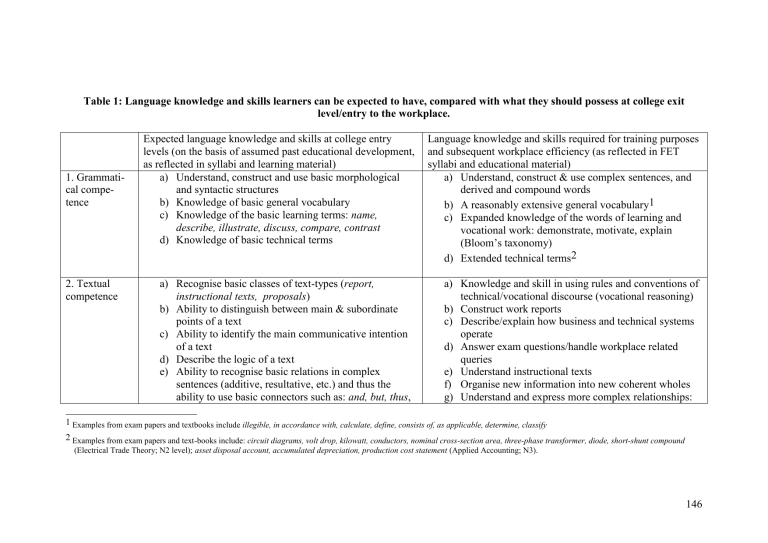
Table 1: Language knowledge and skills learners can be expected to have, compared with what they should possess at college exit level/entry to the workplace.
1. Grammatical competence
2. Textual competence
Expected language knowledge and skills at college entry levels (on the basis of assumed past educational development, as reflected in syllabi and learning material) a) Understand, construct and use basic morphological and syntactic structures b) Knowledge of basic general vocabulary c) Knowledge of the basic learning terms: name, describe, illustrate, discuss, compare, contrast d) Knowledge of basic technical terms a) Recognise basic classes of text-types ( report, instructional texts, proposals ) b) Ability to distinguish between main & subordinate points of a text c) Ability to identify the main communicative intention of a text d) Describe the logic of a text e) Ability to recognise basic relations in complex sentences (additive, resultative, etc.) and thus the ability to use basic connectors such as: and, but, thus ,
Language knowledge and skills required for training purposes and subsequent workplace efficiency (as reflected in FET syllabi and educational material) a) Understand, construct & use complex sentences, and derived and compound words b) A reasonably extensive general vocabulary1 c) Expanded knowledge of the words of learning and vocational work: demonstrate, motivate, explain
(Bloom’s taxonomy) d) Extended technical terms2 a) Knowledge and skill in using rules and conventions of d) technical/vocational discourse (vocational reasoning) b) Construct work reports c) Describe/explain how business and technical systems operate
Answer exam questions/handle workplace related queries e) Understand instructional texts f) Organise new information into new coherent wholes g) Understand and express more complex relationships:
1
Examples from exam papers and textbooks include illegible, in accordance with, calculate, define, consists of, as applicable, determine, classify
2
Examples from exam papers and text-books include: circuit diagrams, volt drop, kilowatt, conductors, nominal cross-section area, three-phase transformer, diode, short-shunt compound
(Electrical Trade Theory; N2 level); asset disposal account, accumulated depreciation, production cost statement (Applied Accounting; N3).
146
3. Functional competence
4.
Sociolinguistic competence
5. Functional etc. f) Fit textual information into existing knowledge frames g) Ask questions, answer questions, etc. h) Read simple tables, graphs
Ability to use language to: a) Perform basic learning functions ( understand, respond to questions, describe, explain , etc.) b) Take appropriate notes in classroom situations c) Extract information from source texts d) Classify objects e) Interact in a classroom situation f) Conduct peer tutoring and handle collaborative learning activities g) And so on a) Distinguish between formal and informal style b) Knowledge of appropriate address and reference terms c) Select appropriate language, variety causal, adversarial, resultative h) Understand/present and interpret information in tables, graphs, diagrams a) Ability to understand work-related concepts and use them appropriately in problem-solving situations b) Explain vocational activities/behaviour (e.g. what the problem was with an electrical circuit, and how it must be repaired) c) Construct descriptive, explanatory, etc. texts d) Identify vocational problems, determine solutions, manage resolution (e.g. faulty electrical system) e) Demonstrate a critical ability f) Organise and manage work teams g) Negotiate about work issues a) Use technical registers effectively and appropriately b) Interact effectively with superiors and subordinates c) Communicate cross-culturally, with professional and with non-professional people, managing dysfunctional communication d) Handle job interviews e) Obtain the co-operation of team members f) Possess and project self-confidence in vocational contexts, and portray an understanding of their place in the vocational world a) Recognise bias, ideological perspective
147
literacy
6. Meta-cognitive ability _ b) Handle psychological and cultural alienation c) Understand the workplace and its role in larger society a) Possess the necessary meta-linguistic ability to handle dysfunctional communication (e.g. verbal abuse) between workers and line-managers
148


